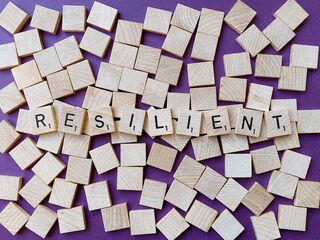Resilience
Resilience Isn’t Something You Just Build
Resilience is more complicated than modern experts seem to believe.
Posted July 28, 2021 Reviewed by Jessica Schrader
Key points
- It's important to define resilience, which can refer to either the way individuals manage difficult experiences or how quickly they bounce back.
- Discussing resilience as a muscle is an oversimplification.
- Although reframing can be an effective technique, it is often not enough on its own.

I recently read an article by Heather Younger on building resilience at work which offered three steps for doing so. I was pleasantly surprised to find the article did not make claims about resilience that were excessively overhyped, like what often comes out of scholarly and popular press articles touting the benefits of resilience training[1]. However, there were a few aspects of the article that I would challenge, which is what I plan to do here. My criticisms fall generally into three domains:
- There was no actual definition of resilience provided.
- Conceptualizing resilience as a muscle oversimplifies what resilience is and isn’t.
- Reframing can be adaptive, but it has limits.
No Definition of Resilience
The first issue was that the author provided no definition of resilience. Although there are cases where we can reasonably conclude everyone is starting with the same implicit definition of a key term or concept, this isn’t a valid assumption when it comes to resilience. Here’s the official definition from the APA Dictionary of Psychology:
n. the process and outcome of successfully adapting to difficult or challenging life experiences, especially through mental, emotional, and behavioral flexibility and adjustment to external and internal demands. A number of factors contribute to how well people adapt to adversities, predominant among them (a) the ways in which individuals view and engage with the world, (b) the availability and quality of social resources, and (c) specific coping strategies. Psychological research demonstrates that the resources and skills associated with more positive adaptation (i.e., greater resilience) can be cultivated and practiced.
So, resilience can be defined as both a process and an outcome. In other words, resilience can refer either to the way individuals adapt to, manage, or cope with various difficult, unexpected, or challenging experiences or it can refer to how quickly individuals bounce back from those experiences. It isn’t clear by reading the article whether Younger is referring to ways to improve one’s ability to manage challenging demands or how to attenuate one’s reactions to stressful events. Both aspects are important, as I will discuss in my final thoughts.
Resilience Is Not a Muscle
It isn't uncommon for various psychological terms, like resilience, to be discussed as a muscle[2]. The idea behind this metaphor is that we improve our resilience by exercising it and strengthening it. While it’s true that actual muscles develop through use, to increase them beyond some threshold requires planning, effort, and work. We must proactively seek out experiences that will increase muscle mass for both momentary (e.g., bench pressing weight) and extended (e.g., bench pressing reps) use. If you attempt to bench press a weight that exceeds what you’re currently capable of, you risk serious injury. Likewise, if you attempt to bench press a comfortable weight for too many reps, you also risk serious injury. If, over time, you intentionally build your capabilities, you could eventually be able to safely bench press that amount or increase the reps you’re capable of.
The idea that we should improve our resilience by seeking out challenging situations has limitations. Certainly, experiences that challenge us or that we find difficult provide the opportunity to develop and refine heuristics that can help us navigate similar future situations. When similar situations arise, we’ll have an expanded frame of reference—the experience won’t seem quite as challenging because we have the experience of managing it previously[3]. Over time, the opportunity to refine our existing heuristics should help us become more resilient. However, if we find ourselves in situations that far exceed our capabilities or tax our resources for too long, we’re likely to experience adverse consequences. The more excessive the demands (either acutely or temporally), the greater the risk.
All this so far is in line with what Younger argued. However, beyond certain structured opportunities for development, like taking on stretch assignments or expanding our work role into areas that might be new to us, very few people (at least I hope) are going to actively seek out more taxing experiences strictly so they can receive the benefits of becoming more resilient. Even if we’re capable of bouncing back from crises or traumatic events, very few people would willfully put themselves in such situations for the resilience benefits they might receive.
That means employees won’t have the opportunity to develop or refine those heuristics or expand their frame of reference unless and until those crises are experienced. Weathering a storm and learning from it is one thing, but it’s often better to learn to avoid crises altogether rather than learning how to adapt to them when they occur.
There’s a lot of tension when it comes to this concept. On the one hand, without these difficult experiences, we don’t have the opportunity to develop resilience. On the other hand, it’s generally better to avoid excessively difficult experiences if we can. Unlike building muscle mass or stamina, we’re often not able to intentionally plan these demanding experiences that might build our resilience or to control how much demand they place on our resources. As such, the metaphor of resilience as a muscle is highly limited. From a development standpoint, it might be best to consider ways of creating controlled difficulty, where employees are forced to navigate their way through some challenges without managers or others stepping in right away.
Reframing Can Be Effective, But…
I certainly agree with Younger that reframing can be a very useful technique for better managing difficult situations. If, for example, we learn to see difficulties as challenges to be overcome, it can lead us to rely on more adaptive responses directed toward growth and overcoming the difficulty. But if we see difficulties as impossible situations, we’re more likely to rely less on problem-focused strategies directed toward addressing the difficulty and more on less adaptive emotion-focused strategies like withdrawal[4] or rumination.
Younger mentions that this isn’t always easy to do, but this is a significant understatement. There’s a reason why reframing is taught as a component of cognitive behavior therapy (CBT)—it isn’t easy to just implement on your own. Additionally, though reframing can be effective, its effectiveness varies depending on the problem or challenge we’re trying to reframe. It can be quite useful for everyday work challenges, but it may be less beneficial for more severe problems—at least as the sole form of coping.
Final Thoughts on Building Resilience
I certainly agree that more resilient workers are going to have an easier (note, easier ≠ easy) time adapting to various challenges and difficulties in the workplace. However, there isn’t an easy way to cultivate resilience. Although we can try to give people the tools to better manage the various challenges life throws their way, resilience is best developed via experience.
Creating opportunities for controlled resilience building in the workplace may be a more useful approach to cultivating the long-term benefits of resilience than any other strategy except signing up all employees for personalized CBT. Even then, it’s important to recognize that the bulk of resilience is going to be grounded in employees’ experiences and may not translate to dissimilar experiences[6].
That was perhaps the most challenging aspect of COVID and the lockdowns that occurred because of the pandemic: many people didn’t have comparable enough experiences on which to rely, leading to a lot of trial-and-error coping. Eventually, many people found their way to more adaptive and healthy ways of managing the challenges. But many others found their way into more maladaptive strategies, like alcohol or drug use, rumination, or complete withdrawal, which can be very difficult to break and lead to long-term disastrous outcomes.
References
Footnotes
[1] Two recent reviews, one by Joyce et al. (2017) and one by Forbes and Fikretoglu (2018), concluded that: resilience training has, at best, small effects, the literature varies tremendously in quality, and the effectiveness of this training on later functioning is suspect.
[2] I have seen this same metaphor applied regularly to topics like self-control and willpower.
[3] The reader should not take this to mean that having a single difficult challenging experience means all future similar experiences will be easy to handle. Rather, resilience is developed by having similar experiences over time that allow us to, each time, get better and better at managing them.
[4] Withdrawal can be a useful short-term coping strategy. It is quite adaptive when we lack the resources to address an issue at that moment or need some time to get our emotions more under control (so they don’t adversely affect our decision making). However, withdrawal can become maladaptive when we simply fail to come to terms or address the difficulty, leading us to experience more significant emotional or other consequences.
[5] Especially since it’s hard enough to do it for yourself
[6] This also makes it extremely difficult to offer formal resilience training. A capability that is developed via contextual experiences isn’t going to be effectively cultivated in a one-size-fits-all training setting. Training can offer some insights or provide some tools for self-management, but the real benefit comes from cultivating effective heuristics that help us manage demanding situations with the least adverse effect possible.




